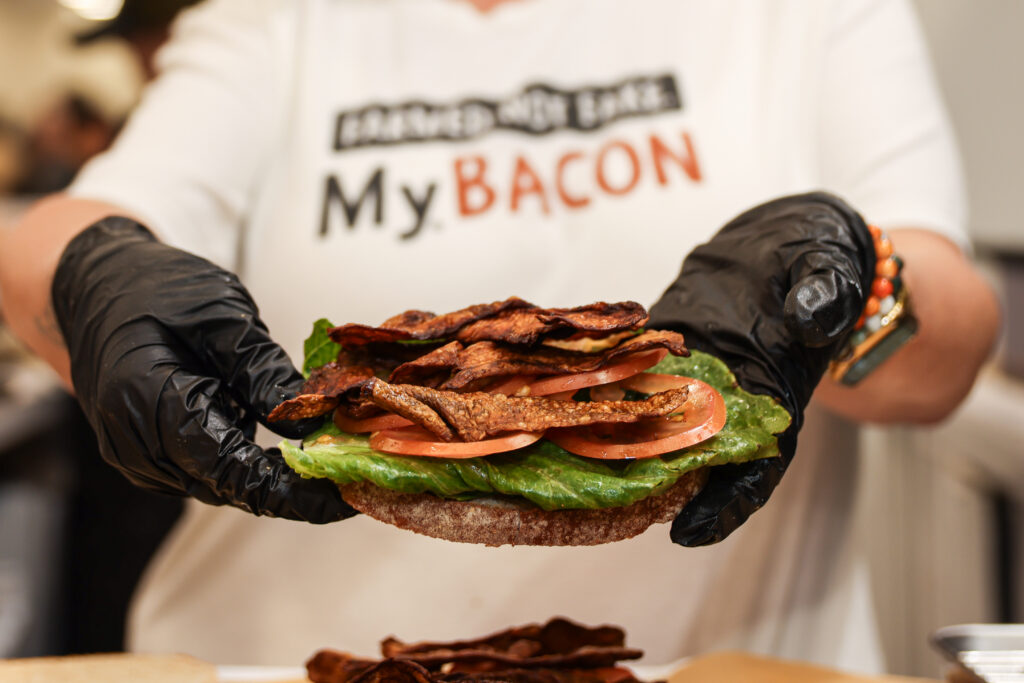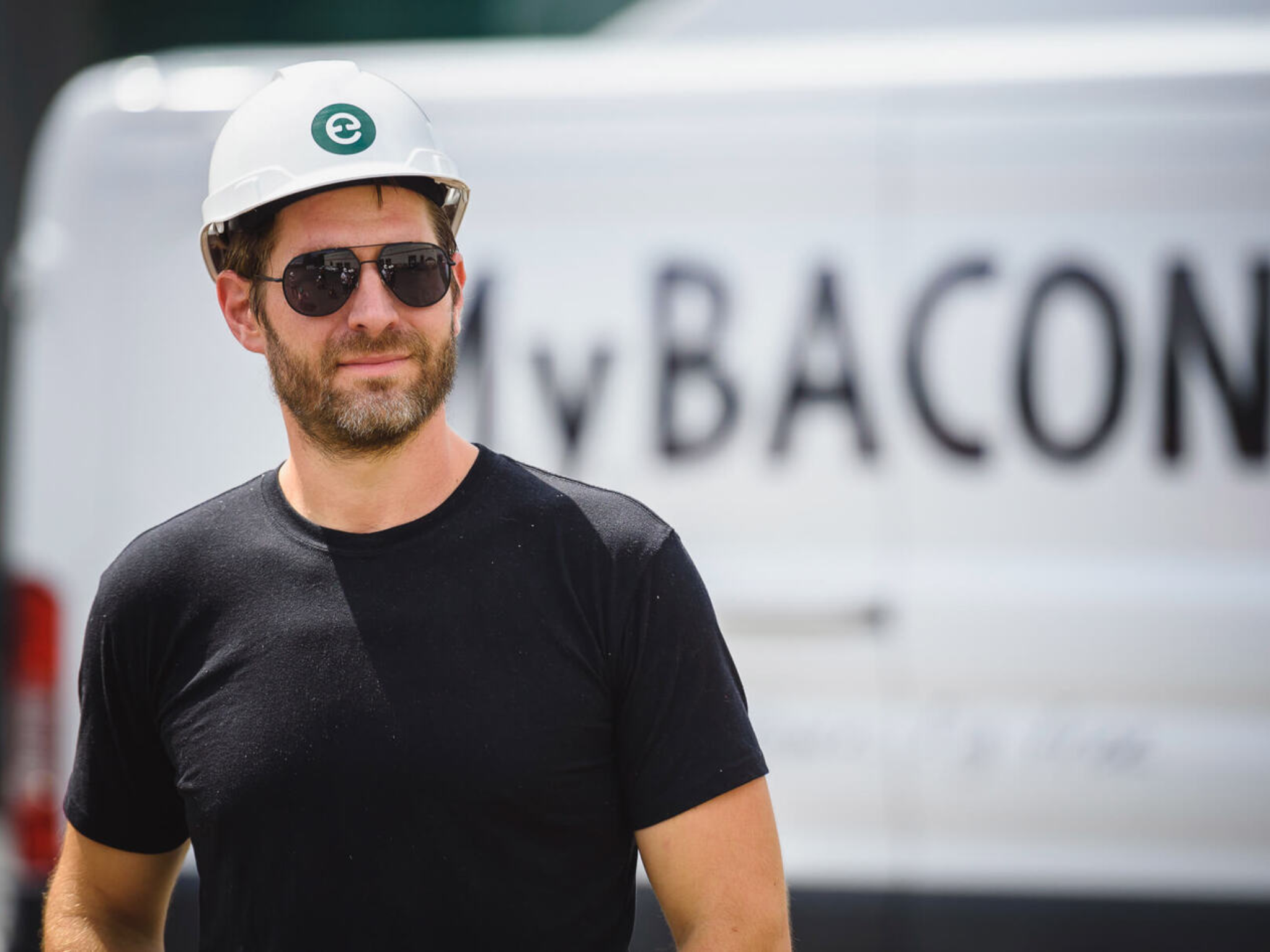Ecovative Raises $11M After Outselling Meat Alternatives with Mycelium-Based MyBacon
5 Mins Read
New York firm Ecovative has secured $11M to supercharge the expansion of its mycelium-based MyBacon, which it claims is the fastest-selling plant-based breakfast item in the natural channel.
Mycelium innovator Ecovative has raised $11M in new funding to fuel the “explosive growth” of MyBacon, the mycelium-based meat alternative sold under its spinout company, MyForest Foods.
The round was largely led by existing investors, alongside a $1.7M grant and loan from the Advance Albany County Alliance, and will specifically support the “ongoing scale-up of our MyBacon production”, Ecovative founder and CEO Eben Bayer tells Green Queen.
The company has now attracted $156M in investment since 2019. And to date, $82M has been raised into MyForest Foods. This latest capital injection will help the firm expand the production capacity of MyBacon, hire new staff, launch a whole-cut mycelium product, and enter the foodservice channel.
“Every dollar is focused on scaling the business and bringing more high-performance mycelium products to market,” says Bayer.
He notes that Ecovative is creating a “whole new protein category” with AirMycelium, its proprietary tech that grows mushrooms on an industrial scale in vertical farms, allowing it to produce three million sq ft of material annually on one acre of land.
The different strains of mushrooms are used for a variety of applications, including sustainable alternatives to plastic and leather, sold under its various sub-brands Forager, Mushroom Packaging and Grow.bio.
Why MyBacon is outselling its competitors amid UPF concerns

The primary focus of this new funding round is MyForest Foods, whose flagship bacon product has become the fastest-selling plant-based breakfast item in the natural channel, outperforming competitors with three times the average sales velocity, according to the company. It’s available at over 1,200 retail points, including Whole Foods, Erewhon, and Fresh Direct, plus on Hungryroot, Purple Carrot and Good Eggs in the direct-to-consumer channel.
“It’s pretty simple,” Bayer says when asked about the product’s success. “MyBacon performs like meat because we grow it whole and keep it simple, harvest slabs of gourmet mycelium, salt, sugar, smoke flavour, pasteurise, and pack. We’re not trying to mimic meat with a long list of ingredients and additives. We’re growing mycelium tissue that naturally has a meat-like structure and umami flavour.”
He adds: “Most companies are trying to engineer their way to meat-like properties – we’re letting biology do that work, much like traditional animal farming, and consumers can taste the difference. It’s an ancient protein, in a whole new format.”
This is a pertinent point at a time when meat alternatives are being vilified by the ultra-processed tag, which has only heightened since Robert F Kennedy Jr took office as health secretary.
“Our process is simple – we grow and harvest mycelium, it is sliced and then brined in only four ingredients (sugar, salt, coconut oil, and natural flavours). There’s no grinding and binding like you see with other products – it’s a whole structure,” says Beyer.
“We don’t need to use heavy processing or a long list of ingredients to force materials into meat-like textures because mycelium naturally grows with the right structure. It’s a fundamentally different approach that consumers recognise immediately, both when they look at our simple ingredient list and when they taste the product.”
MyForest Foods to launch whole-cut mycelium and enter foodservice

The cash infusion will primarily support the expansion of Ecovative’s production capacity. “We’ve invested in specialised equipment that allows us to grow and harvest mycelium at commercial scale, as well as the downstream processing and packaging capabilities needed to meet retail demand,” says Beyer.
“We’re also investing in our science and engineering teams to continue improving our production platform and developing new whole protein products.” One of these innovations is coming this summer in a shredded mycelium format.
“It addresses different culinary applications than MyBacon while maintaining the same core advantages: simple ingredients, whole-cut structure, and superior cooking performance. We’ve had chefs testing it for months with excellent feedback on its versatility and flavour absorption capabilities,” says Beyer.
Speaking of which, the bacon recently received a FABI award from the National Restaurant Association, a marker of “significant validation” from culinary professionals. This will help Ecovative’s cause since it is launching into foodservice this year, opening up a new channel for MyBacon.
The company recently built a new packaging facility for MyBacon at its Green Island headquarters, which has ramped up production capacity threefold and is a “critical part” of Ecovative’s growth. It will soon open a MyForest Foods Food Science Lab to develop the new whole-cut mycelium products.
Attracting investors when many others have failed

While most alternative protein players have struggled to raise funds over the last couple of years, Ecovative has been an outlier. In 2024, when investment in the industry dropped by 27%, the firm secured $28M, part of which was earmarked for MyBacon’s expansion.
“The investment bubble in alt proteins was built on promises that weren’t technically feasible at scale,” contends Beyer. “Many companies rushed to market with products that didn’t meet consumer expectations on taste, price, or ingredients. That’s created a tough environment – we’ve seen many of our peers scale back or scale down or disappear in this period, which creates risk for retailers.”
MyBacon, he points out, doesn’t just sell at thrice the rate of the next best in the category – it does so at a higher price and a high repeat purchase rate. “Our primary marketing tools are demos and word of mouth. We create this product with a manufacturing and growth process that is relatively capital-light and a clear path to exciting operating margins,” he says.
“And critically, we’re a farmed product – real gourmet food grown from organic oyster mushroom mycelium. Our approach leverages established equipment and processes that we’ve adapted specifically for mycelium. This dramatically reduces capital requirements, though doesn’t eliminate them,” he adds.
“We’re also continuing to optimise our production efficiency and drive down costs as we scale,” says Beyer. “In 2025, we’re focused on three things: scaling production capacity to meet the demand for MyBacon, expanding our retail footprint nationwide, and bringing our next whole protein products to market.”



